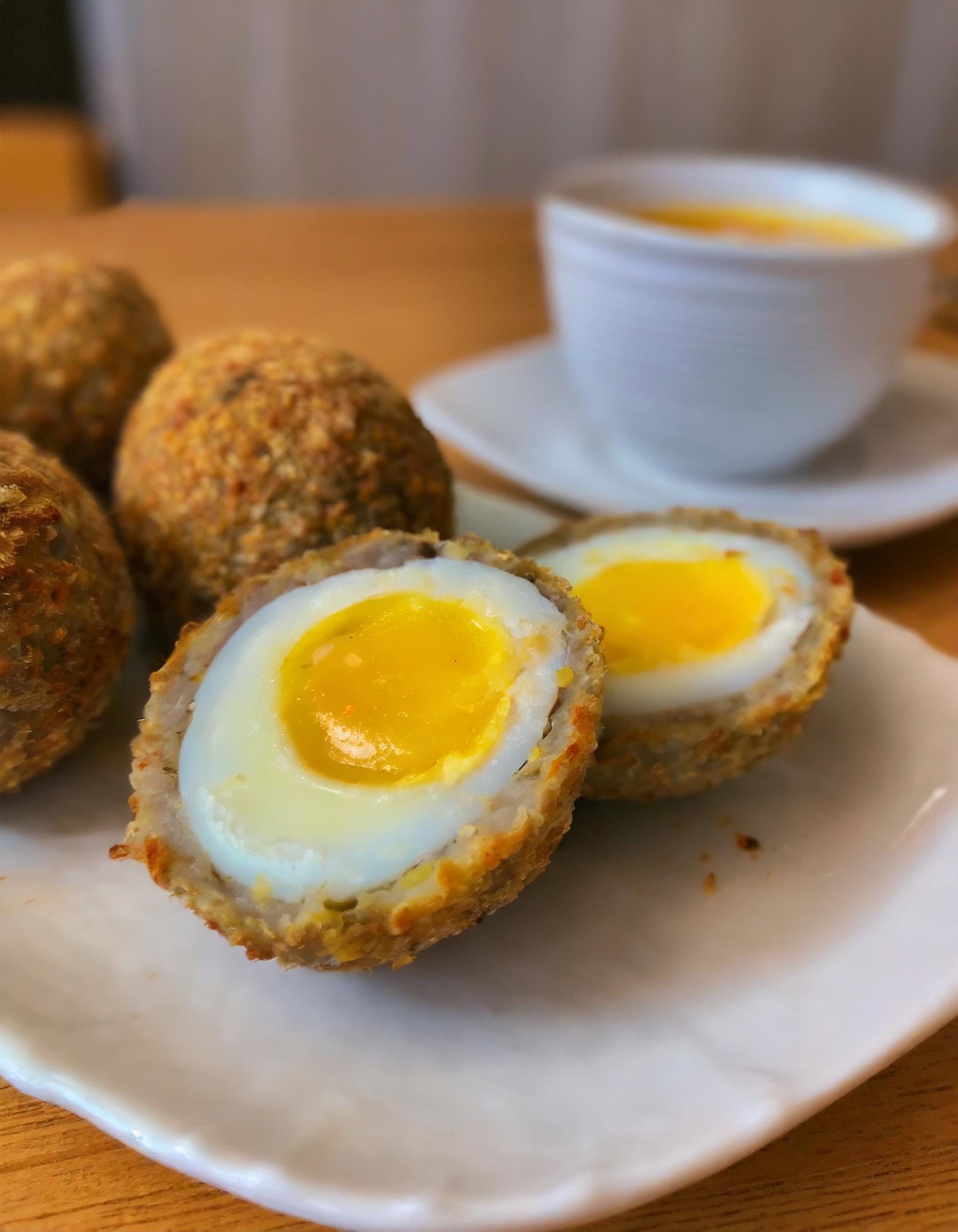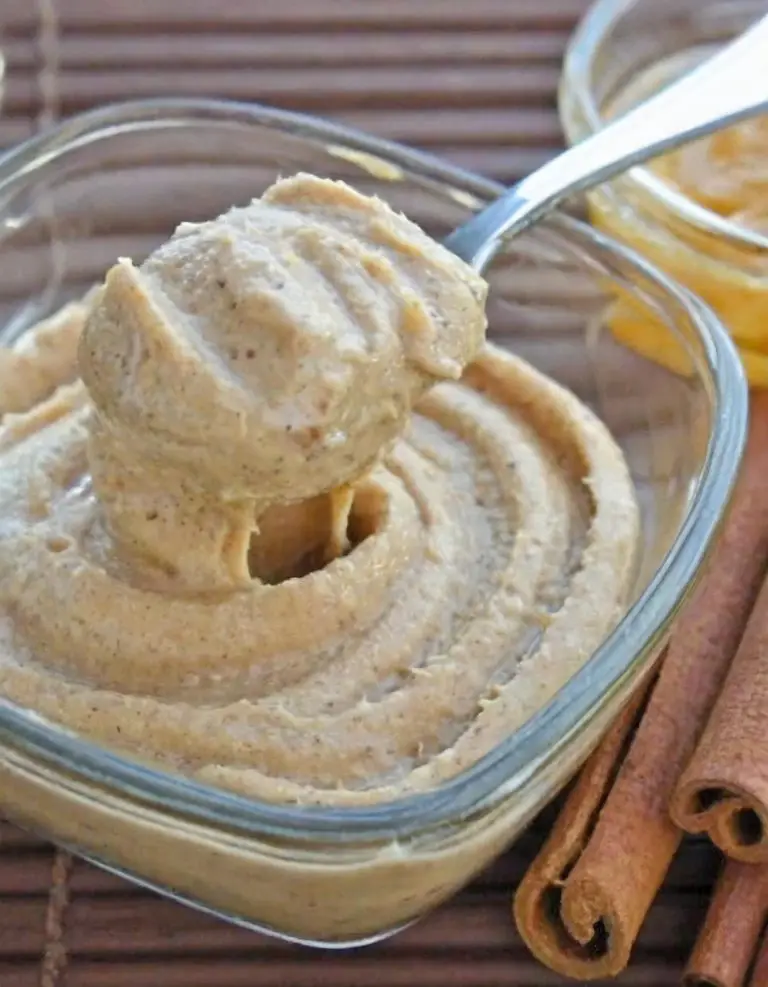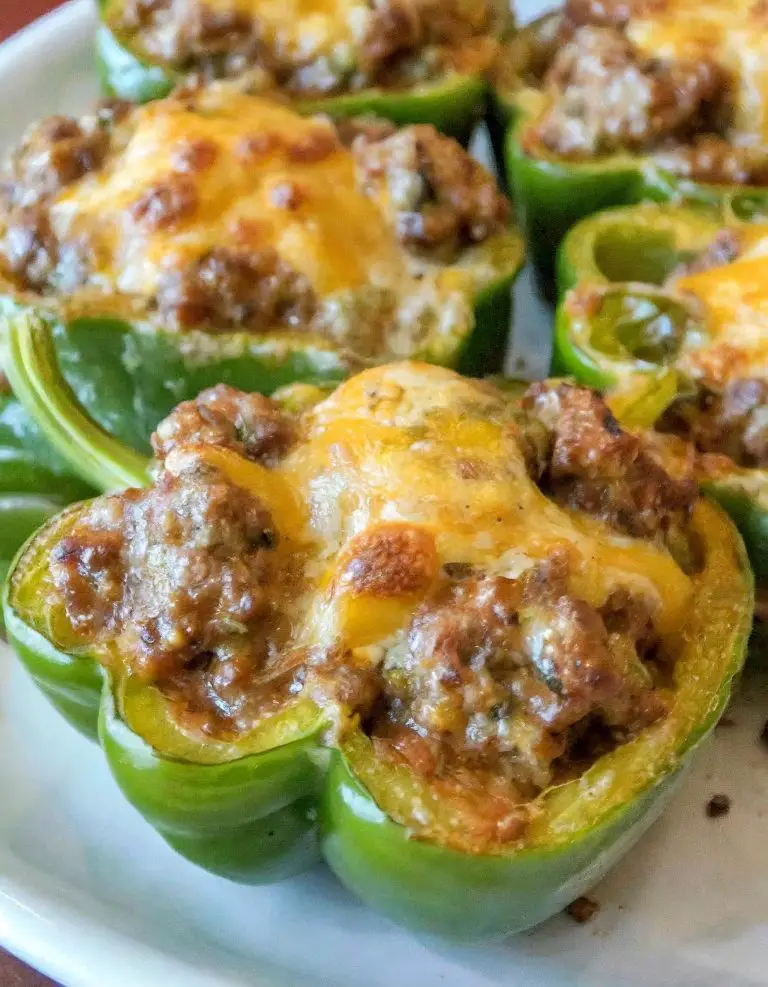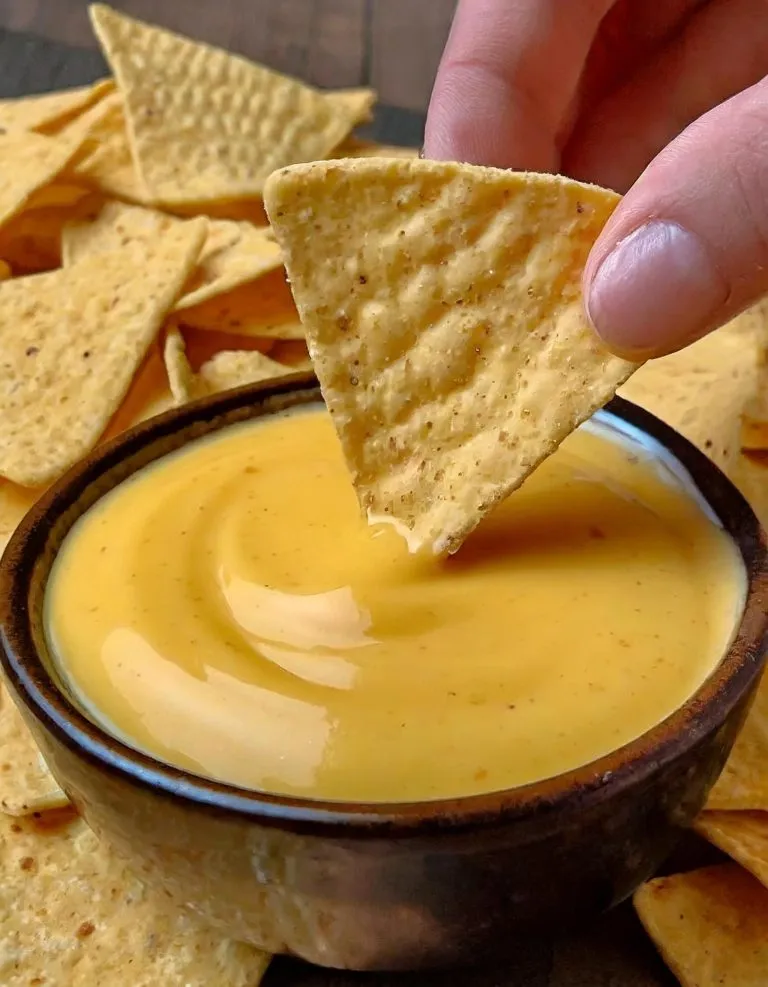Scotch Eggs
Scotch eggs are a delightful British dish that consists of a hard-boiled egg wrapped in seasoned sausage meat, coated in breadcrumbs, and deep-fried or baked until crispy. The contrast between the savory sausage and the creamy egg yolk creates a delicious combination of flavors and textures.

These handheld snacks are perfect for picnics, parties, or as a hearty appetizer. Whether enjoyed hot or cold, Scotch eggs are a versatile and satisfying treat that never fails to please. With their crispy outer crust and flavorful interior, they are a favorite among food enthusiasts looking for a comforting and indulgent bite.
Ingredients Needed for This Recipe
For 4 servings, you will need:
- 6 large eggs (4 for the eggs themselves, and 2 for coating)
- 1 pound of sausage meat (you can use flavored or plain depending on your preference)
- 1 cup of all-purpose flour
- 1 cup of breadcrumbs (panko or traditional)
- 1 teaspoon of mustard (optional, for seasoning the meat)
- Salt and pepper to taste
- Oil for frying (if you’re deep frying)
Instructions for Making Scotch Eggs
- Prepare the Eggs: Start by boiling 4 of the eggs. Place them in a saucepan, cover with cold water, and bring to a boil. Once boiling, reduce the heat to a simmer and cook for about 5 minutes for soft-boiled eggs or 9 minutes for hard-boiled. Remove from heat, cool in ice water, then peel carefully.
- Season the Sausage Meat: In a bowl, mix the sausage meat with mustard (if using) and season with a bit of salt and pepper. Divide the meat into 4 equal portions.
- Wrap the Eggs: Flatten each portion of sausage meat into a thin patty. Place a boiled egg in the center of each patty, and wrap the sausage meat around the egg, sealing it completely. Make sure there are no cracks or openings.
- Coat the Eggs: Crack the remaining 2 eggs into a bowl and beat them. Set up a breading station by placing flour, beaten eggs, and breadcrumbs in three separate dishes. Roll each sausage-covered egg in flour, then dip into the beaten egg, and finally roll in breadcrumbs to coat evenly.
Cook the Scotch Eggs:
- For Deep Frying: Heat oil in a deep fryer or large pot to 350°F (175°C). Carefully lower the eggs into the oil and fry for about 4-5 minutes, or until golden brown and crispy. Drain on paper towels.
- For Baking: Preheat the oven to 400°F (200°C). Place the coated eggs on a baking sheet lined with parchment paper. Bake for about 25-30 minutes, or until the sausage meat is fully cooked and the coating is golden brown.
- Serving: Allow the Scotch eggs to cool slightly before serving. They can be enjoyed warm or at room temperature. Scotch eggs are traditionally served with a side of mustard or mayonnaise for dipping.
Tips for Perfecting the Recipe
Choose the Right Eggs: The size and freshness of the eggs can significantly affect the outcome. Medium to large eggs work best, and fresher eggs are easier to peel after boiling. Consider using eggs that are a few days old for easier peeling.
Boil Eggs to Your Preference: The cooking time for the eggs depends on how runny or firm you prefer the yolk. Soft-boiled eggs give a creamy, runny yolk, while hard-boiled eggs offer a firmer texture. Adjust the boiling time to suit your taste.
Season the Sausage Meat Well: The sausage meat is the flavor powerhouse of your Scotch egg. Use high-quality sausage meat and season it generously. You can add herbs, spices, or even a bit of cheese to the meat mixture for extra flavor.
Ensure a Secure Wrap: When wrapping the eggs in sausage meat, make sure there are no thin spots or holes. A uniform layer prevents the egg from peeking through and ensures even cooking.
Use Panko for Extra Crunch: While traditional breadcrumbs work well, panko breadcrumbs offer a lighter, crispier coating. They absorb less oil, resulting in a crunchier exterior.
Fry or Bake to Perfection: If frying, ensure the oil is at the right temperature to avoid soggy or overly browned eggs. If baking, rotate the eggs halfway through cooking for an even golden crust.
Let Them Rest: Once cooked, let the Scotch eggs rest for a few minutes. This resting period helps the flavors meld together and makes them easier to slice.
Serving Suggestions
Traditional British Pub Fare: Serve Scotch eggs with a side of mustard, mayonnaise, or a tangy chutney. They’re a staple in British pubs, often accompanied by a pint of ale or stout.
Breakfast or Brunch: Cut a Scotch egg in half and serve on a bed of mixed greens for a hearty breakfast. They pair beautifully with toast, baked beans, or tomatoes for a fulfilling brunch.
Picnic Basket Stars: Scotch eggs are excellent for picnics since they’re delicious cold or at room temperature. Pack them with some cheese, crackers, and fruit for a delightful outdoor meal.
Appetizer or Party Snack: Mini Scotch eggs make fantastic appetizers. Use quail eggs instead of chicken eggs for bite-sized treats that are sure to impress at any gathering.
Storage Tips
Cool Before Storing: Allow Scotch eggs to cool to room temperature before storing them to prevent condensation from making the breadcrumbs soggy.
Refrigerate Properly: Wrap each Scotch egg individually in cling film or place them in an airtight container. They can be stored in the refrigerator for up to 3 days.
Freezing for Later: Scotch eggs can be frozen before or after cooking. For uncooked eggs, freeze them on a baking sheet before transferring to a freezer bag. Cooked eggs should be cooled and wrapped tightly before freezing. They can be stored for up to 3 months.
Reheating: To maintain their crispiness, reheat thawed or refrigerated Scotch eggs in the oven at 350°F (175°C) until heated through. Microwaving is not recommended as it can make the coating soggy.
Frequently Asked Questions
Can I make Scotch eggs without meat?
Yes, vegetarian versions use a mixture of chickpeas, lentils, or falafel as a substitute for sausage meat.
How can I prevent the coating from falling off during cooking?
Ensure the eggs are completely dry before wrapping in sausage meat, and coat them thoroughly at each stage of the breading process. Chilling the breaded eggs for 10-15 minutes before cooking can also help.
Why do my Scotch eggs have a green ring around the yolk?
A green ring indicates overcooking. To prevent this, cool the boiled eggs quickly in ice water immediately after cooking.
Can I use different types of meat?
Absolutely. Feel free to experiment with ground turkey, chicken, or even a vegetarian meat substitute. Season accordingly to ensure a flavorful result.
How do I know when the Scotch eggs are cooked through?
If frying, the outer coating should be golden brown, and the meat should no longer be pink. When baking, use a meat thermometer to ensure the internal temperature reaches 160°F (71°C) for pork or 165°F (74°C) for poultry.
Scotch Eggs

Ingredients
- 6 large eggs 4 for the eggs themselves, and 2 for coating
- 1 pound of sausage meat you can use flavored or plain depending on your preference
- 1 cup of all-purpose flour
- 1 cup of breadcrumbs panko or traditional
- 1 teaspoon of mustard optional, for seasoning the meat
- Salt and pepper to taste
- Oil for frying if you’re deep frying
Instructions
- Prepare the Eggs: Start by boiling 4 of the eggs. Place them in a saucepan, cover with cold water, and bring to a boil. Once boiling, reduce the heat to a simmer and cook for about 5 minutes for soft-boiled eggs or 9 minutes for hard-boiled. Remove from heat, cool in ice water, then peel carefully.
- Season the Sausage Meat: In a bowl, mix the sausage meat with mustard (if using) and season with a bit of salt and pepper. Divide the meat into 4 equal portions.
- Wrap the Eggs: Flatten each portion of sausage meat into a thin patty. Place a boiled egg in the center of each patty, and wrap the sausage meat around the egg, sealing it completely. Make sure there are no cracks or openings.
- Coat the Eggs: Crack the remaining 2 eggs into a bowl and beat them. Set up a breading station by placing flour, beaten eggs, and breadcrumbs in three separate dishes. Roll each sausage-covered egg in flour, then dip into the beaten egg, and finally roll in breadcrumbs to coat evenly.
- Cook the Scotch Eggs:
- For Deep Frying: Heat oil in a deep fryer or large pot to 350°F (175°C). Carefully lower the eggs into the oil and fry for about 4-5 minutes, or until golden brown and crispy. Drain on paper towels.
- For Baking: Preheat the oven to 400°F (200°C). Place the coated eggs on a baking sheet lined with parchment paper. Bake for about 25-30 minutes, or until the sausage meat is fully cooked and the coating is golden brown.
- Serving: Allow the Scotch eggs to cool slightly before serving. They can be enjoyed warm or at room temperature. Scotch eggs are traditionally served with a side of mustard or mayonnaise for dipping.







